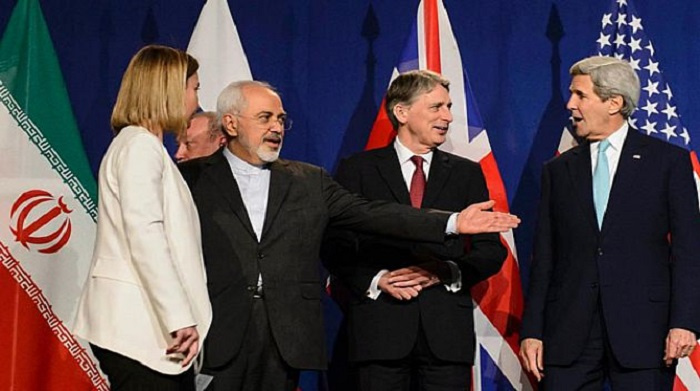Lausanne Achievement: Remaining Nuclear at No Extra Cost

We certainly feel proud that our diplomats sit with confidence in front of the diplomats of the 6 great powers of the world and defend their programs which were different from what the western countries had assumed. The role played by Mr. Zarif in organizing such a program both in the political and media dimensions cannot be ignored; the people’s happiness which was manifested in the streets shows the beauty of this activity which has entangled our country for almost a decade.
It is very interesting to note that the US Secretary of State, who is very occupied with different issues of the world, was present in these negotiations similar to Mr. Zarif who, in comparison, has less responsibilities with regard to world issues. How powerful can Iran be and how could it benefit from this power? Who should administer Iran? Is the government of Iran willing to talk to the world based on international laws or does it intend to interact with the world or not?
Following the Lausanne Statement, there were supporting and opposing views expressed by the experts. But the clarification of the US’ positions by Mr. Obama and his emphasis on the multi-phase lifting of sanctions and the reaction of the highest-ranking Iranian officials based on their demand on the one-phase lifting of sanctions which led to negative reactions by the White House Spokesperson and the French and British Foreign Ministers have, once again, cast a shadow of ambiguity over the result of these negotiations. It was only Mr. Obama who attempted to calm the atmosphere stating that there are difficult tasks to be done during the next three months. Then the Foreign Relations Committee of the US Congress adopted a bill which bounds the US administration to gain the approval of Congress for any agreement which is going to be made. Of course, harsh statements are expected to be heard from both sides during the next few months but the main question is, is this process moving towards the resolution of this big issue or is this crisis going to become more complicated?
From now on, the US negotiators will ask Iran to give more concessions so that they could attract some Senators towards themselves, otherwise the Congress will not approve this agreement. In other words, their demand will be similar to that of Mr. Netanyahu. There is this possibility that this harsh stance would be opposed by the P5+1 member countries which would then create new conditions but will not resolve this problem.
Nonetheless, it seems that the results of more than nine months of long negotiations are more or less similar to what has been stated in the factsheet published by the US. It means that what the 6 big powers of the world desire for Iran’s technological power is similar to what has been pointed out in those three sheets. Prior to the publication of this factsheet, the Iranian party had left everything secret about these negotiations and nobody was aware of the content of these negotiations. In other words, it is not important whether the sanctions are to be lifted in one phase or several phases. What is important is that we have accepted to reduce the enriched material to 300 kilos and after spending a huge amount of money for the construction of the Fordow plant we will transform it into a center for research and development for 10 or 20 years.
In any agreement which is to be disclosed soon, taking positions which are contradictory to the reality may be used for face-saving for the normal people but not for the officials who are involved in the matter, especially in the US wherein the two competitive powerful parties control each other . This approach may work in countries where the governments control the media. The Democratic Party and the present US administration is selling this policy to its society, that limiting Iran’s nuclear activity through diplomacy and with the tools of sanctions is more economical than the alternative proposed by Israel and the Republican Party. The cost and benefit is the axis of the discussions carried out in the US and cannot be kept from the public. Of course, Iran’s diplomacy hopes that the war-mongers will not succeed in the future election.
The nuclear project is different from all other projects in Iran due to its nature and the issue of national pride. The path through which this project has reached the present conditions should be reviewed; has this project begun its task after numerous sessions of discussion by the experts and politicians?
Nevertheless, this project has inflicted heavy costs on the people of Iran both from the aspect of opportunities and resources. The result of these negotiations shows that in order to gain the necessary technology for industry and economic development, one must not necessarily pay high costs. These resolutions could have been prevented from being adopted if harsh positions were not taken against other countries which had domestic use for a number of people who did not have enough information about these matters and only worsened the situation. These imprudent measures created more unemployment and created difficulties for the people and also widened the gap between our country and the developing countries of the world particularly our competitive neighbors and disrupted Iran’s twenty-year perspective document.

